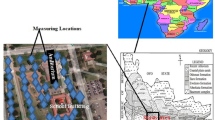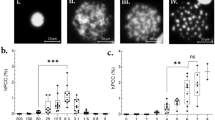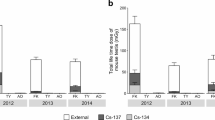Abstract
DESPITE much work on the induction of mutations in mice by ionizing radiations1 and chemicals2–6, the possible mutagenic effects of internally administered radioisotopes have received little attention (see, however, ref. 7). Any genetic effects of radioisotopes are important from the point of view both of the hazards of radioactive fallout and of the use of certain isotopes in human medicine. We present here the results of preliminary observations of the effects of phosphorus-32 in work concerned with the evaluation of genetic hazards of certain important radio-nuclides in mice. Phosphorus-32 is known to produce mutations in Drosophila8 and in micro-organisms9.
This is a preview of subscription content, access via your institution
Access options
Subscribe to this journal
Receive 51 print issues and online access
$199.00 per year
only $3.90 per issue
Buy this article
- Purchase on SpringerLink
- Instant access to full article PDF
Prices may be subject to local taxes which are calculated during checkout
Similar content being viewed by others
References
Russell, W. L., Nucleonics, 23, 53 (1965).
Auerbach, C., and Falconer, D. S., Nature, 163, 678 (1949).
Falconer, D. S., Slizynski, B. M., and Auerbach, C., J. Genet., 51, 81 (1952).
Bateman, A. J., Genet. Res., 1, 381 (1960).
Cattanach, B. M., Nature, 180, 1364 (1957).
Partington, M., and Bateman, A. J., Heredity, 19, 191 (1964).
Luning, K. G., Frolin, H., Nelson, A., and Ronnback, C., Nature, 197, 304 (1963).
Blumel, J., Science, 111, 205 (1950).
Rubin, A., US Atomic Energy Commission Document, AECU, 693 (1950).
Bateman, A. J., Heredity, 12, 213 (1958).
Author information
Authors and Affiliations
Rights and permissions
About this article
Cite this article
REDDI, O., VASUDEVAN, B. Induced Dominant Lethality in Mice by Phosphorus-32. Nature 218, 283–284 (1968). https://doi.org/10.1038/218283a0
Received:
Revised:
Issue date:
DOI: https://doi.org/10.1038/218283a0



